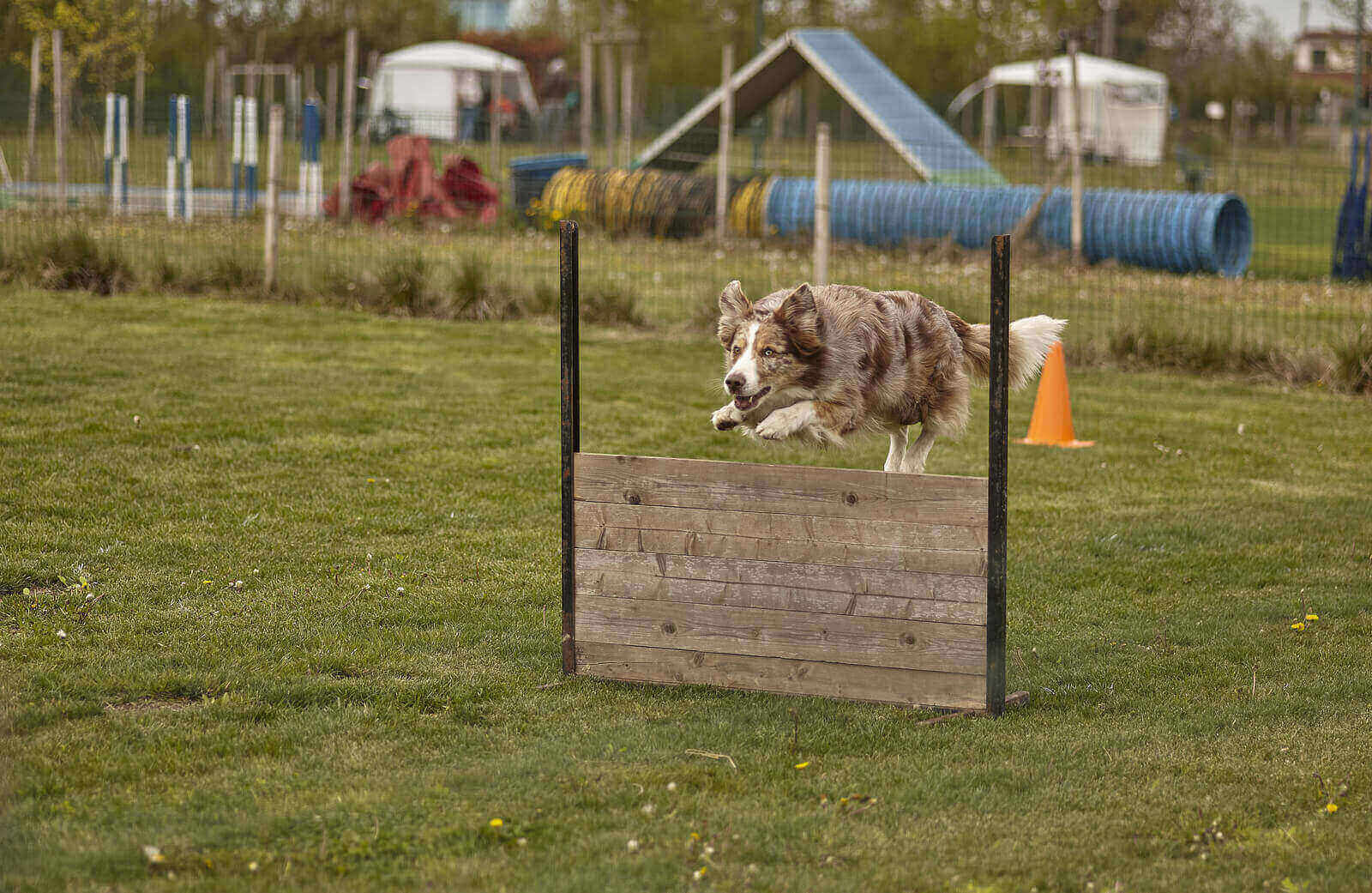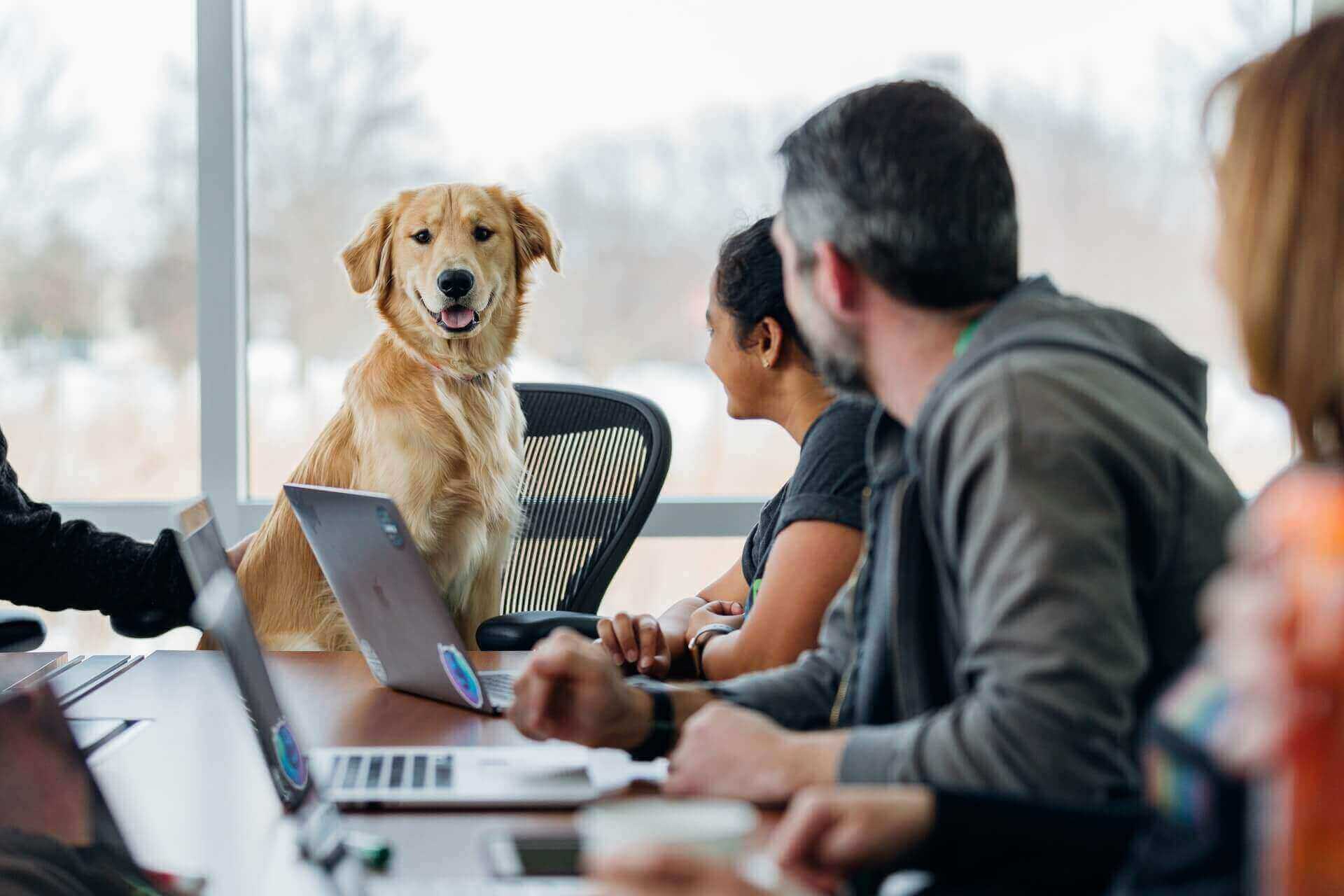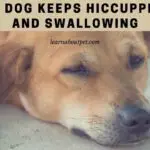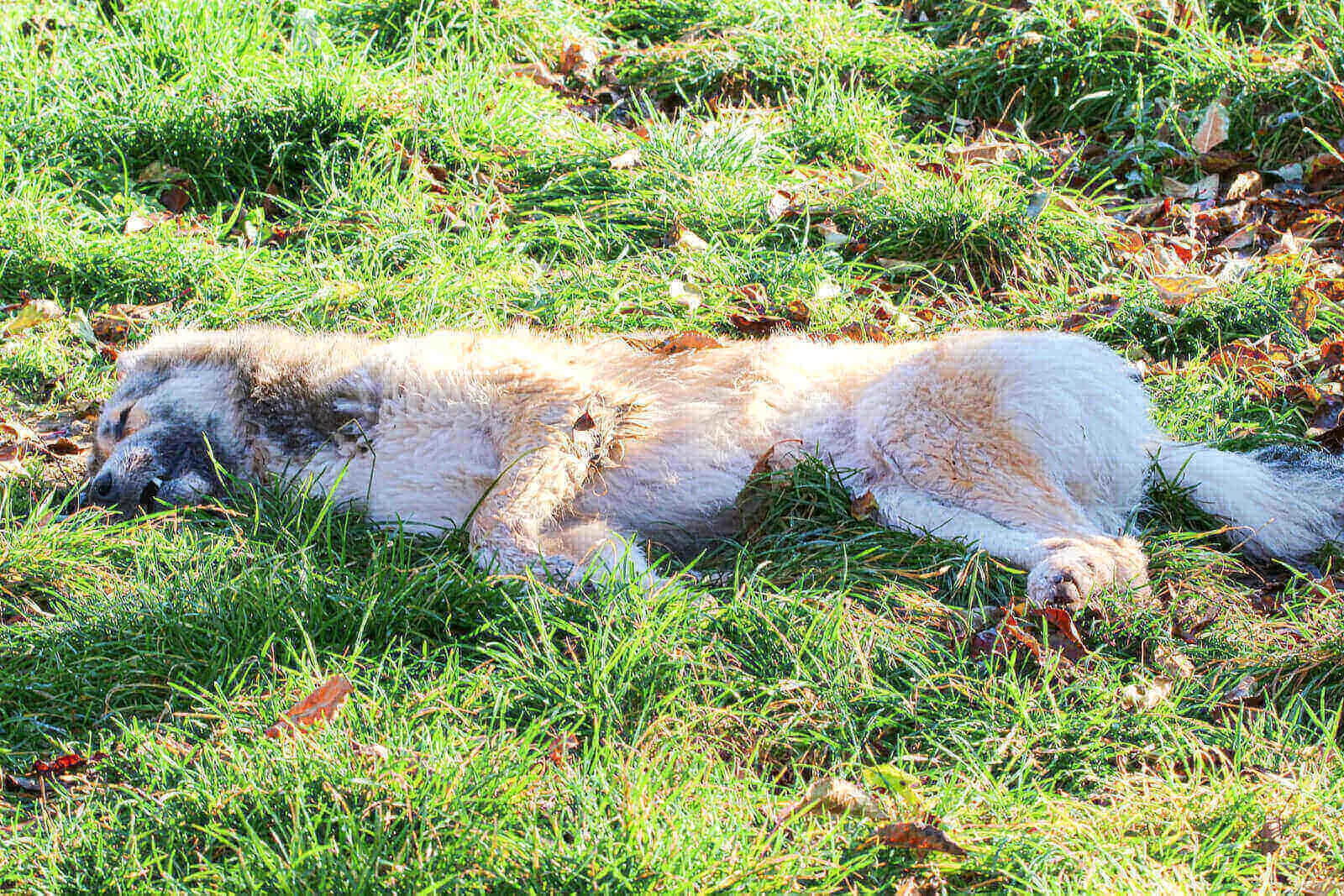If you are a pet owner and a dog lover you are surely very conscious about every minute detail of your dog. Just like us, many other dog owners think, why is their puppy not losing their teeth in young age and get adult teeth.
Why hasn’t my puppy lost any teeth? Your dog’s teeth may not have come out because he or she is still not ready. It might possibly be due to your puppy’s retention of puppy teeth. If your pup seems to have a double row of teeth anywhere in its mouth, this indicates that some of its puppy teeth have been maintained.
When Do Puppy Teeth Fall Out?
Many people are worried that my 8-week old puppy has no teeth while others are worried about dog teething at 1 year.
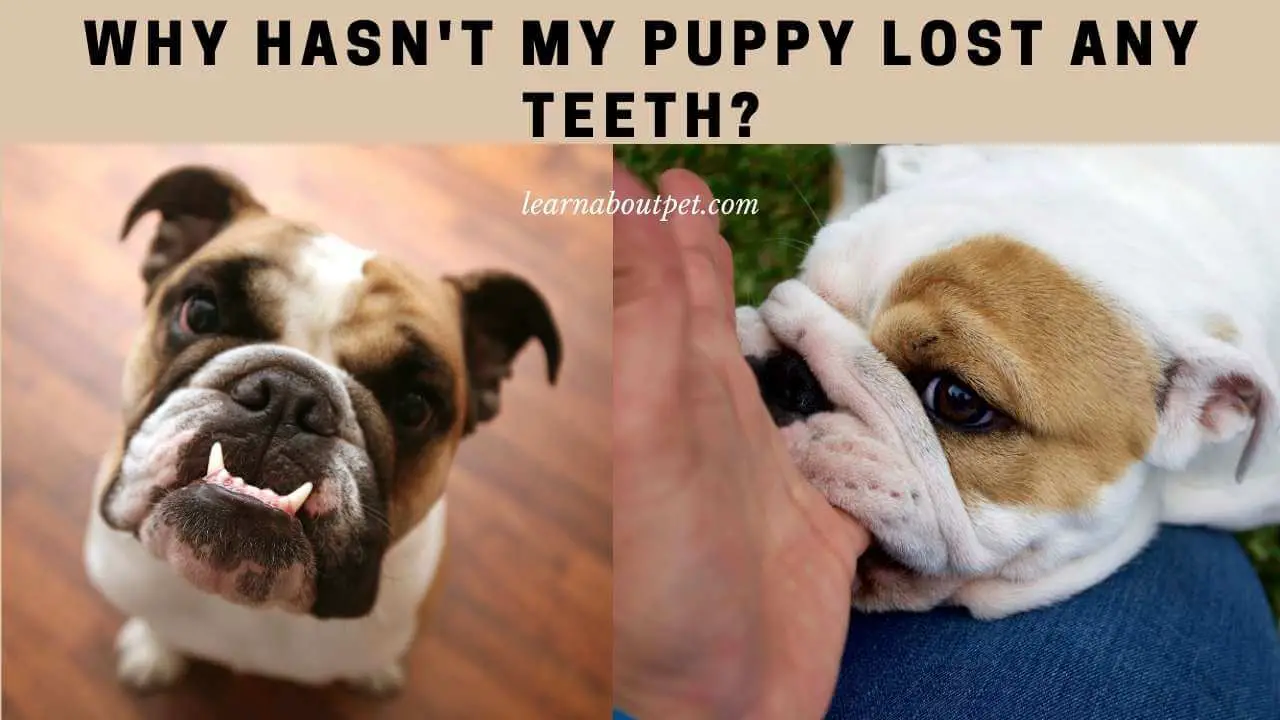
So when do puppies’ teeth fall out? Dogs begin teething at around 3 weeks of age, and by 6 weeks, they have grown all of their missing teeth. The front teeth and canine teeth emerge first, preceded by the premolars. There are no infant molars in dogs.
The deciduous teeth begin to fall out after about 12 weeks, and the permanent teeth begin to emerge. By 6 months of age, all permanent teeth should have emerged and all deciduous teeth should have dropped out.
What Are Dogs’ Retained Baby Teeth?
Are you also concerned that Why Hasn’t My Puppy Lost Any Teeth? And you are also worried about the retained teeth. But what are retained teeth?
Retained milk teeth are the ones which remain in the mouth after the adult teeth have erupted. Baby teeth roots usually reabsorb into the body, resulting in loose teeth that come out easily and make way for adult teeth.
However, when baby teeth are retained, the roots do not reabsorb, and the baby teeth cover the area where the adult teeth should be. Canines and incisors are the most often retained teeth in dogs, although any baby tooth can be kept.
What To Do If Your Adult Dog Still Has Its Baby Teeth?
Because delayed milk teeth can create issues for a dog later in life, it is preferable to get them extracted by your veterinarian as soon as possible.
Many dog owners prefer to extract any remaining baby teeth when their dog is spayed or neutered.
This is because this operation is typically performed at the very same age as when all permanent teeth have appeared, which is six to seven months of age.
If the decayed baby teeth remain in the mouth for an extended period, issues such as aberrant jaw bone development or enamel degradation may occur, which may be irreversible.
Symptoms of Puppy Teething
Teething is not difficult to recognize. Puppy losing teeth symptoms may be excessive nipping or chewing, slobbering, blood splatters on your dog’s toys, gums that are red or swollen, fever, slower-than-usual eating or weeping or whining
If your dog’s teeth are broken or damaged, get guidance and treatment from your veterinarian. A specialist may be told to eliminate baby teeth that have become trapped or are otherwise impeding the growth of adult teeth.
Why Hasn’t My Puppy Lost Any Teeth?
Your dog’s teeth may not even have come out because he or she is still not prepared. It might be due to your puppy’s retention of puppy teeth.
If your puppy seems to have a double incisor anywhere in its regularly even through the mouth, this indicates that some of its puppy teeth have been maintained.
To find out what is truly going on, take a gentle peek into your dog’s mouth. You should be cautious when looking. The objective should always be to make your puppy’s experience with you a good one.
This is essential for handling them and doing dental checkups on them through their lifetimes.
How to Deal with Puppy Teething
A puppy’s teething period is excruciatingly painful. It is your responsibility as a good owner to provide anything for your dog to gnaw on to soothe sore gums and make this procedure a bit more comfortable.
You will be avoiding the puppy discovering anything to chew on his own, whether it is your shoes, your sofa, or your kids’ toys.
The finest teething toys for puppies are determined by the size and activity level of your dog. Rubber teething toys that can be frozen, such as a Kong, appetizing puppy teething rings, and flavored puppy chew toys are among them.
Inquire with your veterinarian about the safest chew toys for your puppy, and remember to constantly watch chewing and fun because nothing is safe for every dog.
According to Dr. Klein, allowing pups and older dogs to chew on anything particularly hard can cause tooth damage. Check the toys on a regular basis to ensure they are not breaking apart.
Your puppy should not be able to gnaw chunks off of them or pull fiber or filling pieces from them. Sticks may also be dangerous, despite the fact that many pups chew on them.
Why Are Puppy Teeth So Sharp
Ok, so have you ever wondered why are puppy teeth so sharp? Puppies have keen teeth that allow them to tell what is alive and what is not! This is natural and should not be interpreted as aggressive behavior.
Dogs attacking people, on the other hand, is not acceptable – and pups must learn how to limit their biting before they lose their baby teeth at about 18 weeks old.
What Happens If A Puppy Doesn’t Lose Puppy Teeth?
A delayed or prolonged baby tooth remains present after the permanent teeth have erupted (between three and seven months of age).
As a result, the permanent teeth may emerge in an aberrant location, resulting in an improper bite pattern.
Retained deciduous teeth can also lead to tooth overgrowth, unintentional biting into the mouth, and an irregular jaw posture.
As with other mouth problems, early detection and prompt dental services are critical to avoiding chronic harm. Sadly, it is frequently overlooked until later in life.
Retained permanent teeth are more frequent in dogs, although they can occur in cats as well. Smaller dog breeds, such as the Maltese, Poodles, Yorkshire Terriers, and Pomeranians, are frequently affected.
Will All My Puppy’s Teeth Fall Out?
Puppies begin teething at about 3 weeks, and by 6 weeks, all of their deciduous teeth have sprouted. By 6 months of age, all adult teeth should have emerged and all temporary teeth should have fallen out.

Do 4-Month-Old Puppies Lose Teeth?
Sometimes I am very amazed to hear the dental problems in dogs and the concerns of their owners. Some are worried about why hasn’t my puppy lost any teeth? While the rest are concerned about the early loss of teeth.
So, much like children, it’s natural for puppies to lose their baby teeth. Infants have 28 sharp, small puppy teeth, which appear at one month and are completely grown by two months. At 4 months, the roots of deciduous teeth begin to resorb.
How Long Until Puppy Loses Teeth?
Puppies start teething about 3 weeks, and by 6 weeks, all of their deciduous teeth have sprouted. The incisors and canine teeth (fangs) emerge first, followed by the primary molars.
There are no infant molars in dogs. The temporary teeth start to fall out about 12 weeks, and the adult teeth begin to emerge. By 6 months of age, all adult teeth should have emerged and all temporary teeth should have dropped out.
When Did Your Dog Lose Their Puppy Teeth?
Dogs usually lose their puppy teeth at about 6 months of age but the teething starts at about 3 months. Temporary teeth starts falling at the age of 12 weeks and all the permanent teeth comes out by 6 months.
What To Do If Your Adult Dog Still Has Its Baby Teeth?
Because delayed milk teeth can create issues for a dog later on in life, it is preferable to get them extracted by your veterinarian as quickly as possible.
Most pet parents prefer to remove any leftover milk teeth when their dog is spayed or neutered because this operation is typically performed at the same age as when all adult teeth have appeared, which is six to seven months of age.
If the delayed baby teeth remain in the mouth for an extended period of time, issues such as aberrant jaw bone development or porcelain degradation may occur, which may be irreversible.
Because pulling or removing infant teeth is a painful and sensitive operation, anesthetic is required. The veterinarian takes care to remove the complete baby tooth root without harming the adult tooth root.
Oral X-rays may also be taken to verify the complete removal of infant dentinal tubules that are not visible beneath the gum line.
When Should I Worry About My Puppy’s Teeth?
Well to be very honest, there’s no need to be concerned if the puppy loses his teeth: it’s quite natural for others who are still growing to escape.
The pups are toothless from the moment they are born, and it is only in the first two weeks of life that the first milk teeth appear, lasting at least a couple of months.
FAQs
What Do You Do When Your Puppy Loses Teeth?
A very frequently asked question is what to do when your puppy loses teeth. I’m going to answer your questions hoping that you will get a satisfactory answer.
A puppy’s teething period is excruciatingly painful. It is your responsibility as a good owner to provide something for your dog to chew on to soothe swollen jaws and make this procedure a bit easier.
You will be prohibiting the pup from discovering anything to chew on on his own, whether this is your footwear, your sofa, or your kids toys.
The finest teething toys for puppies are determined by the size and activity level of your dog. Rubber teething toys that can be frozen, such as with a Kong, edible dog biting rings, and flavored puppy chewing toys are among them.
Inquire with your veterinarian about the safest chew toys for your puppy, and remember to constantly watch chewing and fun because nothing is safe for every dog.
According to Dr. Klein, allowing pups and older dogs to chew on anything particularly hard can cause tooth damage. Check the toys on a regular basis to ensure they are not breaking apart.
Your puppy should not be able to gnaw chunks off of them or pull fibre or filling pieces from them. Sticks may also be dangerous, despite the fact that many pups chew on them.
Why Isn’t My Puppy Losing His Teeth?
It is highly improbable that the baby teeth will come out on their own if they have not fallen out by 9 months of age.
The roots of infant teeth usually disintegrate beneath the gum line, leaving the crown as the only part of the tooth that “falls out.” Every dog, regardless of breed, has 28 baby teeth and 42 permanent teeth.
Final Verdict – Why Hasn’t My Puppy Lost Any Teeth
Why hasn’t my puppy lost any teeth? Many people are worried that why hasn’t my puppy lost any teeth. Puppies usually lose all of their milk teeth by 6 months. However, there are many dogs whose tooth fall is delayed. You should not be worried instantly, rather you should wait patiently for some time. If after 9 months the teeth have not fallen down you should consult a vet.

You should not worry even if the puppy teeth are falling down and bleeding or the puppy tooth fell out while playing if it is its milk teeth. Rather, you should provide him plenty of chewing material to make the procedure of teething easy.

Welcome to Learn About Pet. My name is Rajkumar Ravichandran and I love all pets, travel, and amazing food. I write about my passion and personal experience caring for multiple pets in this blog! ❤️
Post Disclaimer
DISCLAIMER: THIS BLOG OR WEBSITE, "Learn About Pet", DOES NOT PROVIDE YOU WITH MEDICAL ADVICE AND IS NOT A SUBSTITUTE FOR MEDICAL ADVICE. ALWAYS GET IN TOUCH WITH YOUR PERSONAL VETERINARIAN AND USE INFORMATION HERE AS GENERAL ADVICE.
The information, including but not limited to, text, graphics, images and other material contained on this website are for informational purposes only. No material on this site is intended to be a substitute for professional veterinary advice, food recommendation, diagnosis, or treatment. Always seek the advice of your veterinarian or other qualified health care provider with any questions you may have regarding a medical condition or for pet food related questions.
